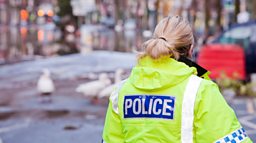Three in ten people that experience anti-social behaviour in local area say they feel unsafe - Survey suggests
The Victims’ Commissioner for England and Wales has told the ����ý that the government must act to help and support the victims of persistent anti-social behaviour.
Baroness Newlove says it can devastate victims' lives, and police and other agencies often fail to recognise the level of harm it can cause.
The Commissioner was responding to an exclusive survey by for ����ý Radio 5 live which asked 2000 UK adults about their experiences of anti-social behaviour.
It found that three in ten people who have experienced or witnessed anti-social behaviour in their local area say it’s made them feel unsafe walking alone in their neighbourhood and 52 per cent are not confident in the ability of the police to tackle it.
The government said everyone had the right to live without fear and its anti-social behaviour action plan, which helps pay for increased police patrols, will be rolled out across the country later this year.
‘I was verbally assaulted, and my partner was physically assaulted with an XL bully hanging off his arms’

Chloe told Radio 5 Live she experienced anti-social behaviour when she moved into her new flat.
She described there being high levels of activity around the area; “[the property] smelled of crack, people were banging on the windows downstairs, I was being stalked to my car”.
Chloe admitted to leaving her house in pairs with her partner and the experience as “really, really traumatic”.
Despite repeatedly calling the police and council, Chloe “wasn’t getting any response”. In the end she said put up her own security camera.

Further detail from the survey shows that more than a third (37%) of women who have experienced or witnessed anti-social behaviour said it’s made them feel unsafe walking alone, while just over one in five (22%) men felt the same way. And one in ten women said it left them unable to leave the house.
Younger adults, aged 18-34, were more likely to say anti-social behaviour made them feel unsafe, with nearly two fifths (39%) of them reporting it was an issue.
The survey also suggests only two in five (40%) UK adults are confident in the ability of the police to tackle anti-social behaviour in their local area.

What is anti-social behaviour?
It’s defined as conduct that causes harassment, alarm or distress to a person. Examples can include a whole host of different behaviours, including unwanted knocks at the door, graffiti, vandalism, littering, drug dealing and noisy dogs. When it happens once, it may not seem serious, but persistent behaviour like this can blight people’s lives.
What is the government doing about the problem?
In March last year, the government promised to crack down on anti-social behaviour and trialled two different schemes in sixteen areas of England and Wales. There were new ‘hotspot’ patrols, involving a higher police presence in places like parks and high streets and ‘Immediate Justice’ schemes, which delivered swift, visible punishments such as perpetrators being made to repair the damage they caused. Some areas trialled both schemes.

In addition, - every police and crime commissioner in England and Wales was given up to £1 million as part of the Safer Streets Fund to run local projects to combat antisocial behaviour, acquisitive crime and violence against women and girls.
A statement from the policing minister, Chris Philp, said everyone had the right to feel safe and live without fear in their communities. He said the government’s anti-social behaviour action plan, backed by £160 million pounds of funding, helps pay for increased police patrols and will be rolled out across the country later this year.
Savanta interviewed 2,300 UK adults aged 18+ online between 15th and 18th December 2023. Data were weighted to be representative of the UK by age, sex, region and social grade.
